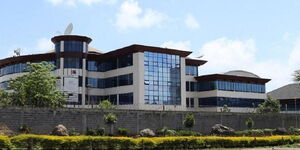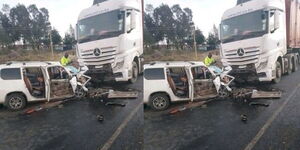Azimio la Umoja has poked holes at the Supreme Court over its decision to limit the powers of IEBC chairperson Wafula Chebukati in the verification and declaration of presidential results.
The coalition party, led by former Prime Minister Raila Odinga, wondered why the seven-judge bench led by Chief Justice Martha Koome ruled that the chairperson does not have the powers to verify and declare results, yet it did not find his declaration of William Ruto as President-Elect null and void.
In a detailed analysis of the full judgement released on September 26, Azimio maintained that the Supreme Court should have nullified the results announced by Chebukati based on its own decision to limit his powers.
"The SC proceeded to emphasize that “The Chairperson does not have executive, special or extraordinary powers with regard to the tallying or verification of results.” The evidence before the court was clear that the Commission had split into 4-3 with the majority rejecting the Presidential Result.
"The Court finds, like it had to, that there was a boardroom rupture and that the Commission has to act in unison, but curiously says there is no evidence of a violation of the Constitution. Indeed, the Court dismisses its own holding about all the members of the Commission being involved by calling the happening at IEBC as “quorum antics”," the letter signed by Makau Mutua and lawyer Paul Mwangi slammed the apex court.
Further, Azimio posed whether the Koome-led bench would use its primary judgement in dismissing the petition to undertake its mandate.
"We wonder whether the Supreme Court itself would view a 3-4 ruling – with a majority of Judges in dissent – as the Judgment of the court," Azimio posed.
In regard to the other five out of seven questions ruled on by the Supreme Court, Raila's team analysed as follows;
Whether Ruto attained 50 per cent plus 1
Azimio opined that the Supreme Court - which stated that the petitioners did not provide enough evidence to prove its case - allowed the IEBC to explain its way out of the matter expressing dissent in the language used to throw out the petition.
"The Court simply accepted IEBC brushing away the issue as a mistake. In fact, the Court characterized this as an “announcement error” and though the correction was being challenged as fraudulent, the court never asked the Chairman to explain or prove any of the figures. This was particularly prejudicial as the court had denied the Petitioners an order of scrutiny of the KIEMS kits," Azimio stated.
Whether the postponement of elections affected voter turnout
Azimio opined that Court resulted in insulting the petitioners rather than ascertaining whether the postponement of the Kakamega and Mombasa gubernatorial polls affected turnout in their stronghold.
"The Court says in paragraph 185 that the claim of the Petitioner “was undoubtedly for another red herring”. Was it not sufficient to simply rule that the Court did not believe that the postponement affected the voter turnout in a way that could alter the final result of the election? Or is it that because it actually could and did?" Azimio queried.
Whether there was interference of Forms 34 A on the portal
Azimio stated that the Supreme Court's decision to rule that there was insufficient evidence in this regard only relied on IEBC's explanation of the workings of the KIEMS kit rather than looking at the affidavits filed by the petitioner's counsels.
Further, the faction stated that the move by the court to reject their submission proving their case dealT them a blow as they could not show how there was interference with the forms.
'This rejection of the Petitioner’s submission was reminiscent of 2013 striking out the “Raila Affidavit” which ensured that the fraud of IEBC was never revealed. But in this case, it is worse because the court generated its own evidence and then rejected the evidence of the parties and decided the case on the court-generated evidence. The Court thereby ceased to be an arbiter but a litigant," Azimio stated.
Whether there were differences in physical Forms 34 A and those uploaded
Azimio stated that the Supreme Court disregarded a section of the scrutiny report which exposed that some of the forms were mismanaged contrary to the standards set by IEBC
"The court never asked IEBC to explain where the booklets were, or, where they had been used, or where the counterfoils were. Instead, the court took the war to Celestine Opiyo and Arnold Oginga who had dared to raise the issue," read the report in part.
Whether the technology deployed by the IEBC met the standards of integrity
Azimio stated that the court failed to consider substantial evidence that detailed how the election technology was manipulated by foreigners.
The faction cited a report by the Directorate of Criminal Investigations (DCI) on their inquiry into three Venezuelans arrested at the Jomo Kenyatta International Airport (JKIA).
"Secondly, the Court ran away from or totally ignored, the evidence presented by the Petitioners that the logs presented by IEBC during scrutiny showed at least four (4) foreigners operating on the IEBC system and deleting and uploading files.
'Shockingly, when the Petitioners filed their own findings on the scrutiny demanded by court, the Judges threw it out. They did not want to see the evidence" Azimio stated












